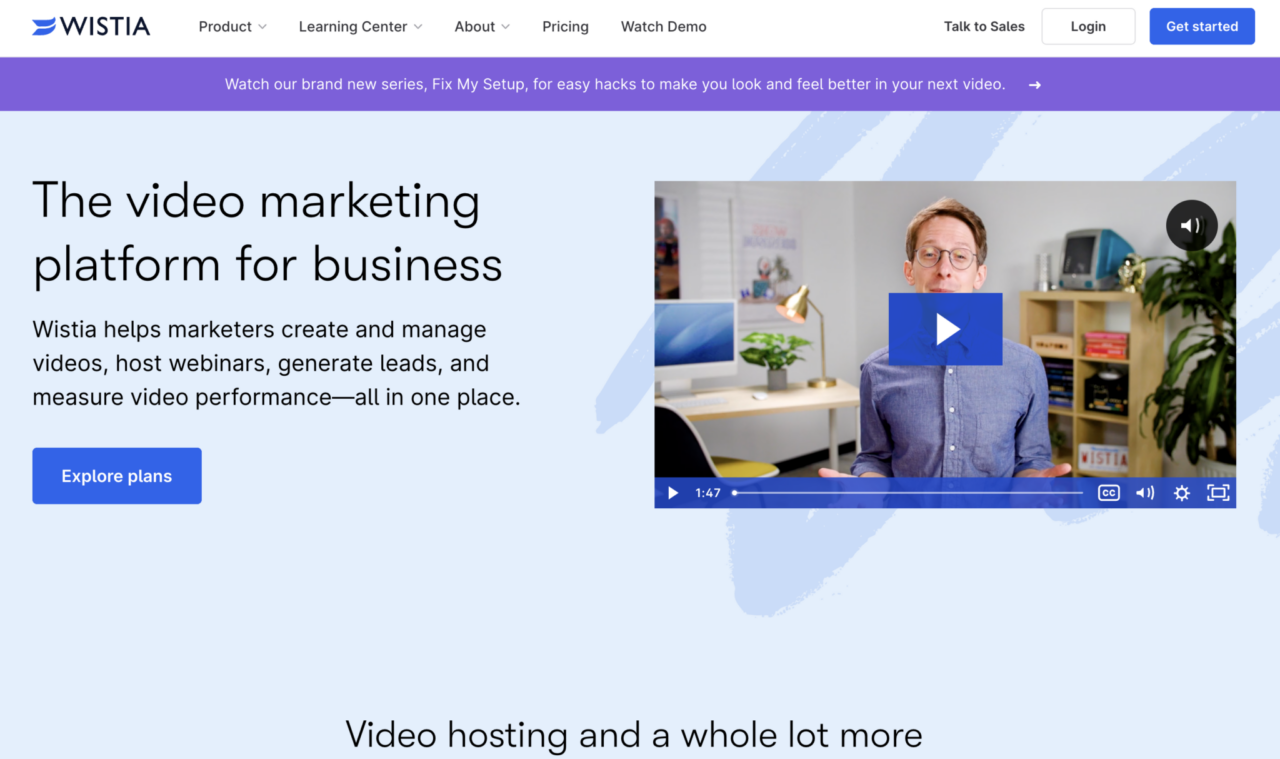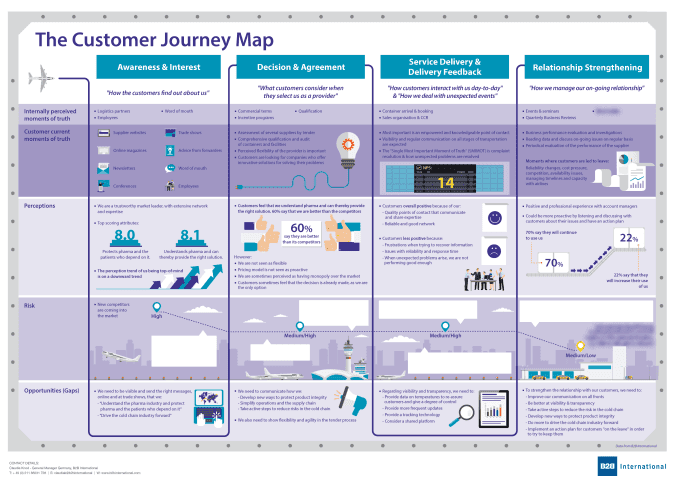Influencers for B2B marketing? Sort of.
As the digital horizon expands, B2B marketing is undergoing a transformative evolution.
Imagine a world where tailored content isn’t just an option, but the very essence of B2B engagement. A realm where your brand’s narrative doesn’t just inform, but captivates and resonates with your target audience.
The future of B2B marketing beckons — are you ready to embrace its potential?
The New Age of B2B Marketing
A report from Ogilvy shows that 75% of B2B marketing leaders are investing in influencer marketing. Modash’s Head of Marketing Ryan Prior states that from his experience that the number is much lower – but still growing.
The team at Wistia has been optimizing their digital media strategy for a good 17 years. They specialize in video hosting and have a proven track record of being incredibly beneficial to their clients.

Chris Savage, the CEO, has been all in on the idea of becoming a leading B2B creator himself. Although B2B marketing is a few steps behind its B2C counterpart, it’s finally starting to catch up as bigger brands look for new ways to engage potential clients and partners through content.
Wistia is leading the charge by doubling down on content creation efforts, like providing industry insights through podcasts. The long and short of it is this: B2B content creation is a market ripe for disruption, and there’s a golden opportunity for businesses to make their mark.
The Rise of B2B Content Creation
Think about the B2C landscape for a moment. It’s flooded with influencers and creators — people who partner with direct-to-consumer brands, adding value to their products and marketing efforts.
But what about the B2B space? It’s a different story altogether.
The general consensus is that B2C marketing often serves as a precursor to B2B trends. While B2C creators have been around and popular for a while, the B2B industry has been somewhat of a laggard in this department. But why is that?
If you’re selling pre-made meal kits in the vein of Hello Fresh or Every Plate, it makes a lot of sense to partner with influencers who can be advocates for your products. The key with influencers is that they often appeal to their audience’s emotions. They’ll lobby for the product or service from a perspective of how much joy or ease they’ve gotten by using the product of the brand that they’re pitching.
B2B brands operate differently.
Engaging B2B decision-makers requires deeper substance and thoughtful content, ensuring that they view the creator brand as a credible business partner. This is because B2B transactions often involve long-term commitments and significant investments, making decision-makers more discerning and cautious in their choices. They seek content that demonstrates expertise, reliability and a clear understanding of their specific needs.

Because deal sizes tend to be way larger than your average B2C transaction, the same kind of appeal that works with B2C content doesn’t quite apply with B2B content. Professional commentaries and insights are the B2B equivalent of the emotional appeal to B2C audiences.
So the rise of B2B content creation is a response to the unique demands and complexities of the B2B market. And as the B2B industry recognizes the power of content in shaping decisions, we’re witnessing a surge in specialized content that not only informs but also builds trust and credibility.
Enterprise-Level Challenges for B2B Creators
Before you start thinking that B2B content creators are the silver bullet for all your marketing needs, let’s talk about some known limitations.
B2B companies, given their often larger scale and complex operations, typically have substantial budgets allocated for marketing and outreach. However, unlike the B2C sector where influencers and creators are abundant, the B2B space faces a scarcity. This shortage is partly because B2B products or services can be more technical, niche and require a deeper understanding to promote effectively.
Additionally, the traditional methods of B2B marketing have been more reliant on direct sales, trade shows and seminars. Which is why there’s a growing need for B2B influencers and creators who can bridge this gap and offer authentic and knowledgeable insights to engage potential business clients online.
Another issue that’s often overlooked is the effectiveness of B2B content in the enterprise segment. Some of the factors for this are:
- Complex Decision-Making Process: Enterprise-level decisions often involve multiple stakeholders, from technical experts to C-level executives. A single piece of content may not address the diverse concerns and interests of this varied audience.
- Longer Sales Cycles: Enterprise sales often have longer sales cycles, sometimes spanning months or even years. While content can initiate interest, the actual conversion might require multiple touch points, in-depth demonstrations and prolonged negotiations.

- High Stakes: The financial stakes in enterprise deals are typically high. Decision-makers are less likely to be swayed solely by content and will rely more on in-depth research, references and direct interactions with the vendor.
- Need for Customization: Enterprises often seek solutions tailored to their specific needs. Generic content won’t resonate as effectively because it doesn’t address the unique challenges or requirements of a particular enterprise.
- Trust and Relationships: In the B2B enterprise world, relationships and trust play a pivotal role. While content can help establish thought leadership and credibility, building trust often requires face-to-face interactions, longstanding reputations and proven track records.
- Regulatory and Compliance Concerns: Especially in sectors like finance, healthcare or critical infrastructure, regulatory and compliance concerns are paramount. Content might provide initial information, but detailed vetting and validation processes are essential before any enterprise-level commitment.
In essence, while B2B content is valuable for raising awareness and generating interest, the intricacies of enterprise-level decisions demand a more comprehensive approach beyond just content marketing.
The Importance of Niche Content in B2B
It’s easy to get lost in the sea of broad content. If your B2B creator role doesn’t focus on a specific vertical or niche, your brand may end up in a mixed bag of irrelevant audiences. Imagine the horror of crafting an exquisite B2B product only to have it marketed to a largely B2C audience. Not a great ROI, right?
Devote your social media channels, podcast, videos or blog to one specific focus.
For example, if your brand handles compliance issues for companies, focus on curating your blog or a B2B podcast agency with highly focused and specialized information that your potential clientele can’t really get anywhere else.
This can’t be a fl-by-night kind of operation. A strong B2B content engine requires being specific and to the point for your audience. They have specific needs that require specific answers, and if you don’t offer any solution to those needs, well, then they may not hang around long enough to engage with your brand.
The B2B Creator Economy Is Still Young
So, where does this leave us?
Despite the limitations, we’re optimistic about the future of B2B content creators. As the creator economy evolves, the role and effectiveness of B2B creators could also grow. Think of it as an NBA player in the early years — the pay might not be as grand, but as the league (or market, in our case) expands and TV deals (or brand collaborations) become more lucrative, the sky is truly the limit.
Remember, the more focused your content, the better. If you plan on venturing into the world of B2B content creation, make sure your content targets a particular sector or topic that directly relates to your business. Your audience will be more qualified, and your impact much more potent.
If you need help creating conversion-driven B2B content, Single Grain’s B2B content marketing experts can help!👇
For more insights and lessons about marketing, check out our Marketing School podcast on YouTube.



